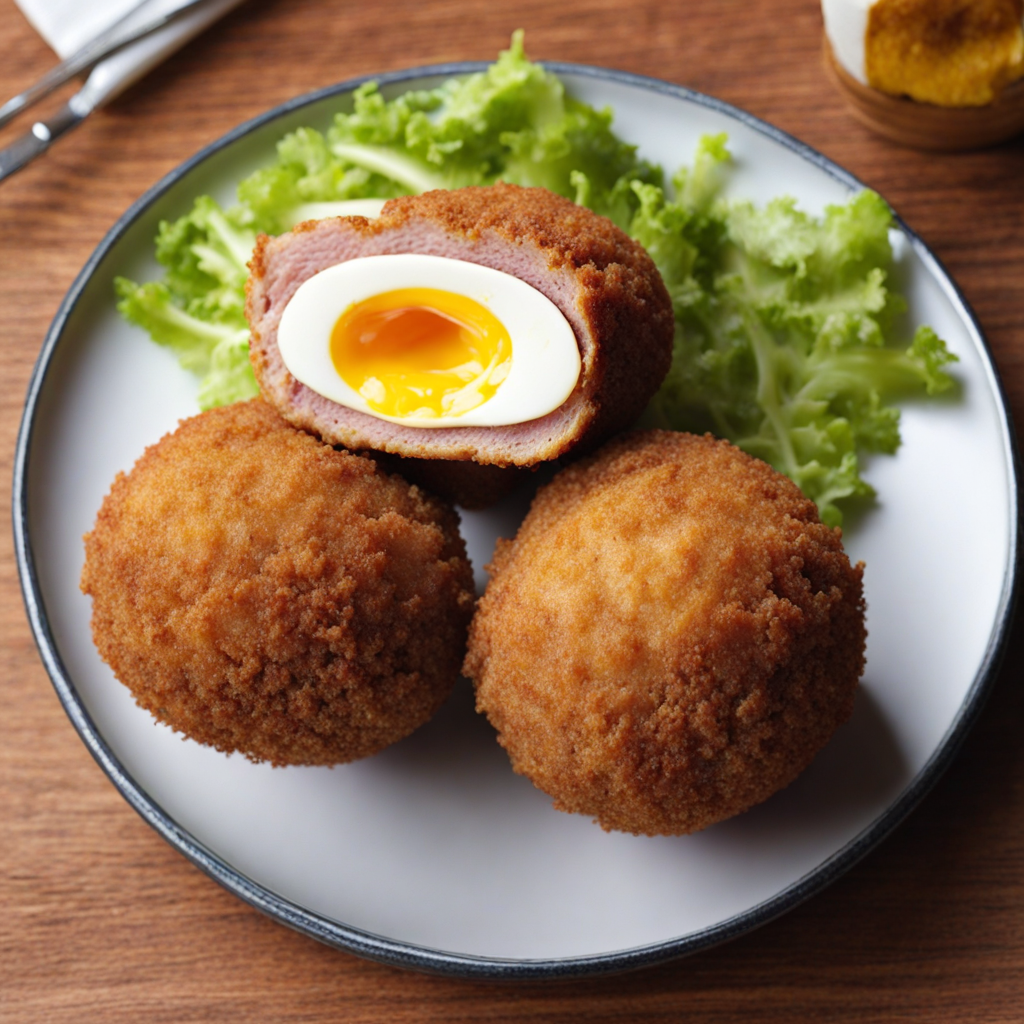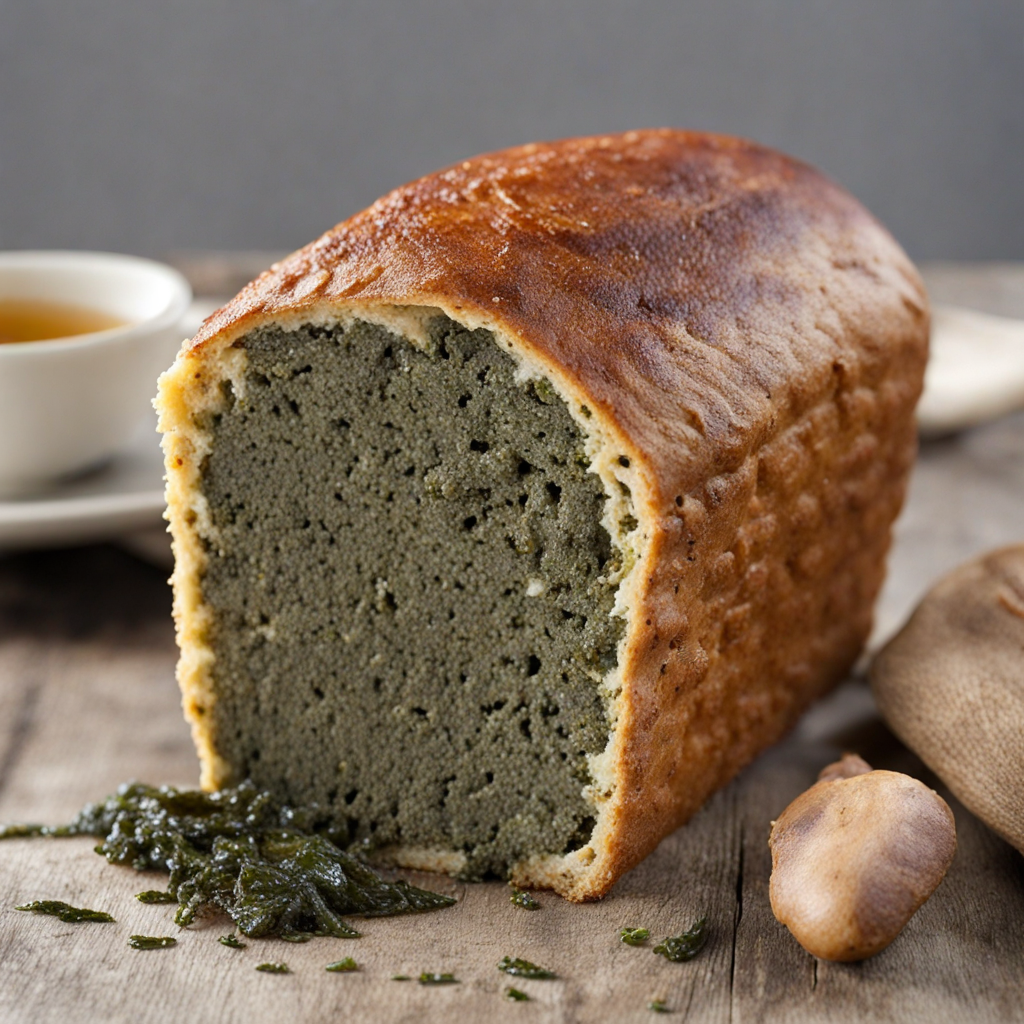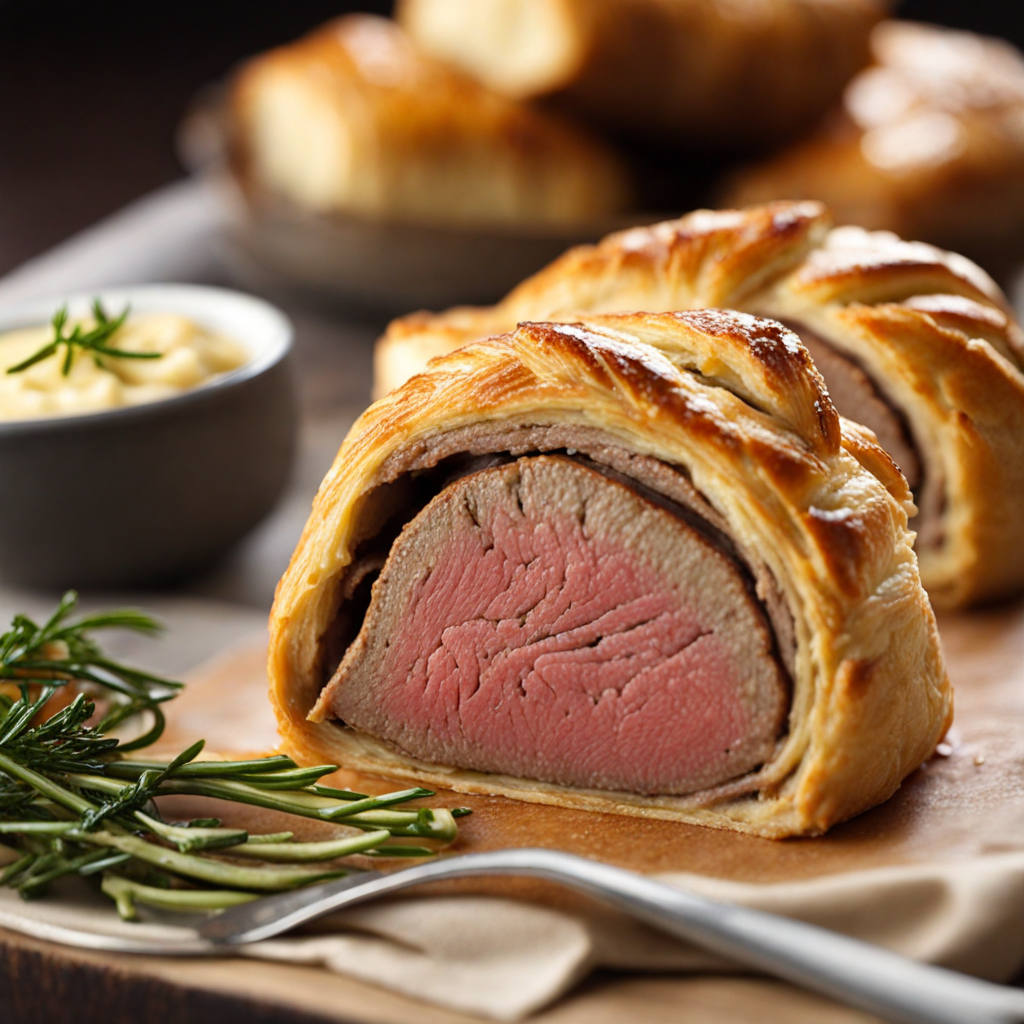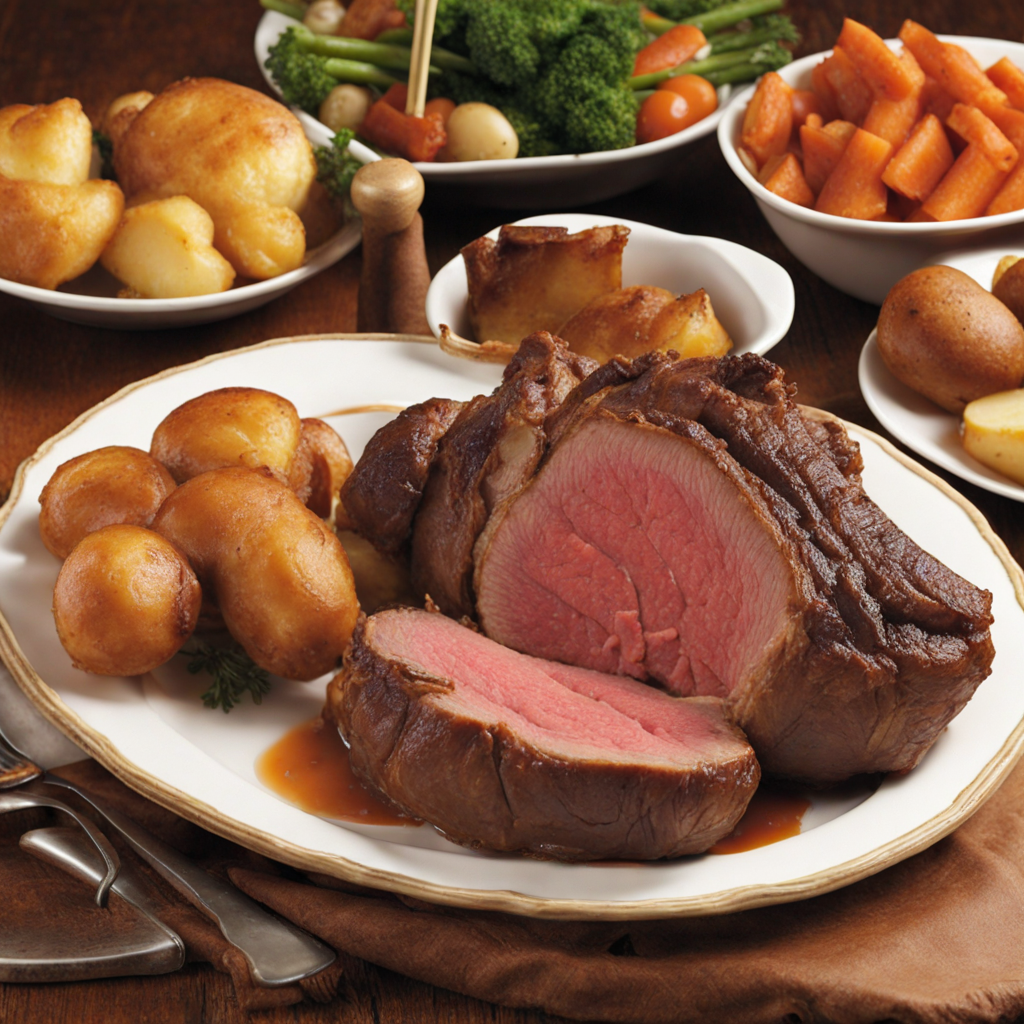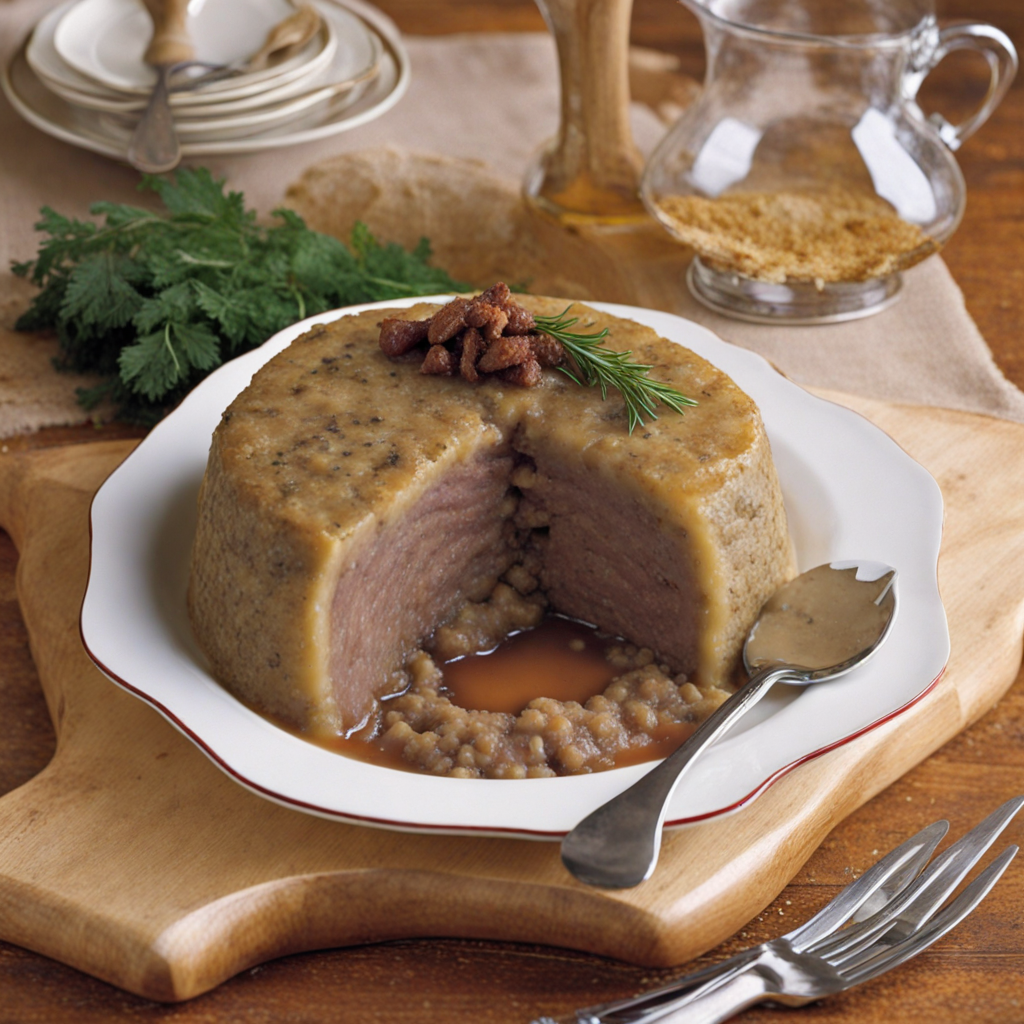Scotch Egg
Scotch Egg is a quintessential British snack that offers a delightful combination of flavors and textures. At its core, it consists of a hard-boiled egg that is enveloped in a layer of seasoned sausage meat. The meat is often flavored with herbs and spices, lending a savory richness to the dish. The egg is typically wrapped in the sausage mixture and then coated in breadcrumbs, giving it a satisfying crunch when cooked. This unique combination of creamy egg and savory meat creates a mouthwatering experience that is both hearty and indulgent. Traditionally, Scotch Eggs are deep-fried until golden brown, resulting in a crispy exterior that contrasts beautifully with the soft, tender interior. However, they can also be baked for a slightly lighter version, which still retains the delightful crunch. The dish is often served cold or at room temperature, making it a popular choice for picnics and pub lunches. Accompanying condiments, such as tangy mustard or rich chutney, elevate the flavor profile and add an extra layer of enjoyment to each bite. Scotch Eggs have a rich history that dates back to the 18th century, and they continue to be a beloved staple in British cuisine. They can be found in various forms, from traditional recipes to gourmet interpretations featuring unique ingredients or flavor combinations. Whether enjoyed as a snack, appetizer, or part of a hearty meal, Scotch Eggs offer a delicious way to explore the comforting and robust flavors of the United Kingdom.
How It Became This Dish
The Scotch Egg: A Culinary Journey Through History #### Origins The Scotch egg, a beloved British snack, has a history that is as layered as the dish itself. At first glance, a Scotch egg appears to be a simple concept: a hard-boiled egg wrapped in sausage meat, coated in breadcrumbs, and deep-fried or baked. But beneath this humble exterior lies a fascinating narrative that traces back to its origins, cultural significance, and evolution over time. The exact origin of the Scotch egg is shrouded in mystery, with several theories vying for attention. One of the earliest documented references to a dish resembling the Scotch egg appears in the 18th century. The dish is often attributed to the renowned 18th-century British chef and culinary writer, William Kitchiner, who included a recipe for "eggs à la mode" in his book *The Cook's Oracle* (1822). However, Kitchiner’s version, while similar, involved a different preparation method, focusing on a more sophisticated approach than the modern-day Scotch egg. Another theory suggests that the Scotch egg may have roots in ancient Middle Eastern cuisine, particularly the Persian dish known as "Nargesi." This dish involved spiced meat wrapped around eggs, a concept that could have migrated to Britain through various cultural exchanges over the centuries. Yet another hypothesis ties the Scotch egg to Indian cuisine, where spiced eggs are common. The British colonial experience in India introduced many culinary influences, leading to a fusion of flavors that may have inspired the Scotch egg’s development. #### Cultural Significance The Scotch egg began to gain popularity in the 19th century, particularly as a convenient and portable snack for picnics and outdoor excursions. It was often enjoyed as part of a cold buffet or served with sides such as pickles and mustard. The advent of the Industrial Revolution, which saw a surge in urbanization and a growing middle class, contributed to the Scotch egg's rise. As people sought easy-to-carry and filling snacks, the Scotch egg proved to be a practical choice. By the mid-20th century, the Scotch egg found its way into pubs and cafés, further embedding itself into British food culture. It became a staple of pub fare, often served as a bar snack alongside a pint of beer. The dish also gained a reputation as a quintessential part of British picnicking culture, embodying the spirit of leisurely outdoor gatherings. Moreover, the Scotch egg has cultural significance beyond its culinary appeal. It has become a symbol of British ingenuity in food preservation, demonstrating how simple ingredients can be transformed into a satisfying and delicious dish. The versatility of the Scotch egg, which can be made with various types of sausage meat and flavored with different herbs and spices, reflects the adaptability of British cuisine itself. #### Development Over Time The evolution of the Scotch egg is marked by various adaptations, both in terms of ingredients and preparation methods. Traditionally made with pork sausage meat, contemporary variations now include chicken, lamb, and even vegetarian options. The introduction of gourmet versions has seen chefs experiment with flavor profiles, incorporating ingredients like haggis, black pudding, and exotic spices to elevate the classic dish. The 21st century has witnessed a renaissance of the Scotch egg, with artisanal producers and gourmet food vendors taking the dish to new heights. Food festivals and markets celebrate this beloved snack, showcasing inventive flavors such as Thai-spiced Scotch eggs or those wrapped in crispy panko breadcrumbs. The rise of social media has also played a significant role in the Scotch egg's resurgence, as food enthusiasts share their creations and variations online, sparking creativity and interest in this traditional dish. In addition to its culinary evolution, the Scotch egg has also found a place in popular culture. It has been referenced in literature, television, and film, often symbolizing British culture and comfort food. The dish has also become a point of pride for local producers, who champion artisanal methods and regional ingredients, contributing to the broader movement of "local food" in the UK. #### Conclusion The Scotch egg is more than just a snack; it is a reflection of British culinary history and culture. From its ambiguous origins to its status as a staple of pub fare, the Scotch egg tells a story of adaptability, creativity, and the enduring appeal of simple ingredients. As food trends continue to evolve, the Scotch egg remains a beloved dish, cherished for its comforting familiarity and endless possibilities for innovation. Whether enjoyed at a picnic, paired with a pint in a pub, or served at a gourmet restaurant, the Scotch egg continues to be a delightful reminder of the rich tapestry of British food history. Its journey from humble beginnings to a modern culinary icon showcases the enduring nature of traditional dishes and their ability to adapt and thrive in contemporary society. The Scotch egg, with its layers of flavor and history, invites us to savor not only its taste but also the stories it carries through time.
You may like
Discover local flavors from United Kingdom



